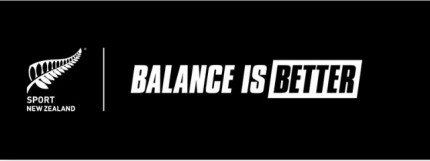Balance is Better
Balance is Better
Recently Time magazine published an insightful article on the professionalisation of youth sports in America.
Check out our new Balance is Better website here

Sport NZ talent consultant Alex Chiet recommends the read as a wake-up call for what could happen in New Zealand if we don’t work to make changes to traditional organised sport.
Read the article How Kids’ Sports Became a $15 Billion Industry
The article tells the story of Joey Eracem, a 10-year-old baseball player who is “an extreme example of what has become a new reality for America's aspiring young athletes and their families” describing how “across the nation, kids of all skill levels, in virtually every team sport, are getting swept up by a youth-sports economy that increasingly resembles the pros at increasingly early ages”.
It’s an environment where one of the three great myths identified in Sport NZ’s Talent Plan thrives, Alex says – the myth that the earlier athletes choose their sport and focus on it, the better. But while there are examples that convince us that myth is true, in fact, earlier is not the case in most situations, Alex says.
The article talks about the growing body of research that shows that intense early specialisation of a single sport increases the risk of injury, burnout, and depression. Yet despite that, kids are getting swept up by a youth sports economy where well-intentioned parents will do anything for their kids: “A range of private businesses are mining this deep, do-anything parental love. The U.S. youth-sports economy--which includes everything from travel to private coaching to apps that organize leagues and live stream games--is now a $15.3 billion market, according to WinterGreen Research, a private firm that tracks the industry,” the article says.
Alex has witnessed that environment living in Canada for four years, and is part of the team at Sport NZ working to encourage sport leaders, coaches and parents to stop and think about how they can do things differently – by putting the needs of the athlete firmly at the heart of decisions, and making positive changes to competition structures.
Participation and involvement in competitive sport among young Kiwis is dropping, he says, with much of that due to societal changes, the role of technology, a lack of physical activity and a drop in sports participation. Alongside that, many young people and athletes with potential are experiencing injuries and fatigue both physically and psychologically and are being driven away from competitive sport.
“The approach we’re advocating at Sport NZ is ‘balance is better’. The first objective is for kids to enjoy their sports experience and stay involved. If we don’t tick that box and find creative ways to engage kids, we’ll struggle to keep kids participating at all, let alone in competitive sport. Then it’s about recognising that rather than pressuring kids to perform, they’ll do better if we encourage them to explore a range of sports and develop a range of skills.”
Alex says that, as New Zealanders, we may think what is happening in the US and other countries is exaggerated and that we are immune to it, but it’s very real: “There’s a huge press for professionalism there, and commercially-driven entities are selling the idea that the road to elitism is about travelling across the country to events, making sure your child is in the top team at a young age and ploughing resources into specialised coaching – we’re starting to see the early onset of that here.
The article notes that children in the US sense that the stakes are rising: “In a 2016 study published in the journal Family Relations, Dorsch and his colleagues found that the more money families pour into youth sports, the more pressure their kids feel--and the less they enjoy and feel committed to their sport.”
To Alex, this comes as no surprise: “We need to remember why young people participate in sport – it’s about fun, the challenge, being part of a team or group, being with friends, and self-improvement. We need to focus on making sure our young people’s first sporting experiences meet those needs so that they want to take part and, through that, develop the skills and confidence to remain in sport throughout their life.”
Read Sport NZ’s Balance is Better resource and supporting case studies
Read the Time article How Kids’ Sports Became a $15 Billion Industry
